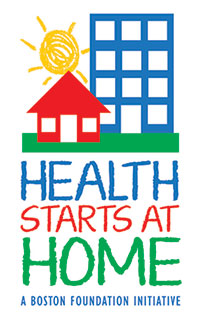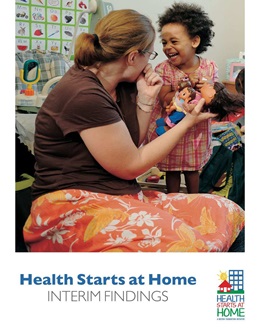
Health Starts at Home
Over the last 10 to 15 years, research has shown that instability in housing, often driven by unaffordable rents, has a profoundly negative impact on children’s mental, behavioral and physical health. The result is higher health-care costs and increased burdens on homeless systems and providers. Linking housing-related supports and health-care provision emerged as a logical recommendation from these studies.
Health Starts at Home has been a five-year initiative hosted by the Boston Foundation to bring together housing and health-care organizations to pilot new approaches that focus on the active benefits of stable, affordable housing on children’s health outcomes. Health Starts at Home has supported partnerships among housing and health-care organizations with the goal of:
- highlighting the importance of affordable housing in children’s health outcomes;
- identifying promising new and existing models that can be brought to scale to improve children’s health outcomes;
- decreasing health care costs; and
- decreasing costs related to homelessness.
Project Timeline
Health Starts at Home was launched in 2014, with an 18-month development and planning phase.
The foundation received 12 planning grant applications representing collaborations among more than 50 organizations. Following rigorous review by a 10-person panel of both internal and external reviewers, four nine-month planning grants of $40,000 were awarded. During this planning period, in addition to refining their interventions, each partnership worked with the evaluation consultants, Health Resources in Action and the Urban Institute, to develop shared measures and data collection protocols for the evaluation of housing and health outcomes.
In May 2016, the Boston Foundation selected four partnerships from among those invited to submit a proposal to receive three years of support ($200,000 per year) to implement their program models and interventions, and to participate in an overarching evaluation of the initiative. The Foundation also provided support for an additional year of data collection and analysis to capture longer-term changes in housing and health outcomes.
Each partnership works with Health Starts at Home’s evaluation consultants, Health Resources in Action and the Urban Institute, to assess program effectiveness through a set of shared measures related to housing stability and children’s health. In addition, these partnerships receive technical assistance and participate in a learning community to continually enhance their programs.
In early 2020, Health Resources in Action and the Urban Institute released an interim findings report that showed in the first six months of the program, caregivers in Health Starts at Home programs had reduced levels of anxiety and depression and felt better about their overall health. The research also found caregivers were more likely to rate their children's health as good or better, and reduced the number of urgent care and emergency room visits they made with their children.
Project Partnerships
Building Bridges to Better Health
Boston Health Care for the Homeless Program, St. Mary’s Center for Women & Children, and Urban Edge partnered to address the health disparities that homeless children experience. With their combined expertise, they have delivered a model of coordinated and integrated services designed to improve access to comprehensive health care, behavioral health services, social supports, benefits screenings and housing search services. This model has sought to ensure access to integrated services while families are in shelter, and to follow families as they transition into housing and support them during this tenuous time to prevent the financial, social and health crises that too often result in a return to homelessness.
Chelsea Homes for Health
This partnership includes major institutions in Chelsea, a mid-size city just north of Boston with a largely immigrant population, where 50 percent of residents cannot afford stable unsubsidized housing. MGH Chelsea, the health-care provider serving the majority of households in the community, and Roca’s program for young mothers have screened families for housing instability as a part of their regular course of care. The screening has provided partners with the knowledge and capacity to refer families to existing, robust services at CONNECT, a collaboration housed at The Neighborhood Developers, from short-term rental assistance to long-term stabilization supports, including benefits screening, financial coaching and services, workforce development resources, housing counseling and peer supports.
Housing Prescriptions as Health Care
This partnership strove to create a seamless system of services for children under age four whose families are high users of emergency health-care services. Medical staff members often do not ask about a family’s housing situation because they cannot offer “treatment.” This model has built on the existing Children’s HealthWatch interview protocol, enabling trained interviewers to ask validated questions and link families to care coordination services at Project Hope. Intensive case management has helped families find, retain and improve their housing by linking services of benefits maximization, legal services, problem solving education and priority access to public housing units.
Mortar Between the Bricks:
Building a One-Stop, Two-Generation Foundation for Health
This partnership includes a nationally-recognized medical provider and poverty law experts focused on policy reform and early childhood development specialists. They’ve joined forces to identify at-risk, housing insecure and homeless patients of Boston Children’s Primary Care at Martha Eliot Health Center and Longwood, using a new universal housing screen. Dedicated social work staff at Martha Eliot coordinated interventions to stabilize families, including intensive legal services, housing workshops, parent trainings, early education and childhood development programs, and referrals to other social services. Through an integrated cross-referral system, this model intentionally focuses on services to both adults and their children, based on a two-generation framework informed by an advisory committee that includes patient parents.
Support
We wish to thank our funding partners in this initiative: The Kresge Foundation, John D. and Catherine T. MacArthur Foundation, Blue Cross Blue Shield of MA Foundation, Partners HealthCare, and Annie E. Casey Foundation for their partnership in this work.
Join the Boston Foundation in supporting the implementation of promising projects developed through Health Starts at Home. To explore making a gift or grant to this initiative, please contact Laura McConaghy, Philanthropic Partnerships Officer, at 617.338.1612.


